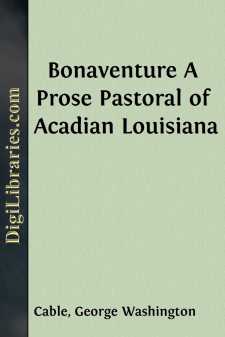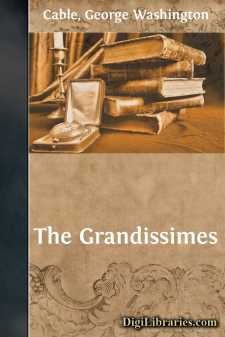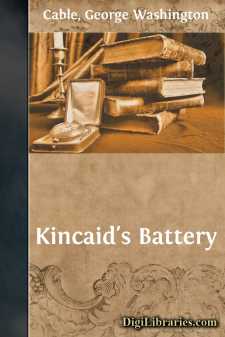Categories
- Antiques & Collectibles 13
- Architecture 36
- Art 48
- Bibles 22
- Biography & Autobiography 815
- Body, Mind & Spirit 144
- Business & Economics 28
- Children's Books 18
- Children's Fiction 14
- Computers 4
- Cooking 94
- Crafts & Hobbies 4
- Drama 346
- Education 58
- Family & Relationships 59
- Fiction 11833
- Games 19
- Gardening 17
- Health & Fitness 34
- History 1378
- House & Home 1
- Humor 147
- Juvenile Fiction 1873
- Juvenile Nonfiction 202
- Language Arts & Disciplines 89
- Law 16
- Literary Collections 686
- Literary Criticism 179
- Mathematics 13
- Medical 41
- Music 40
- Nature 179
- Non-Classifiable 1768
- Performing Arts 7
- Periodicals 1453
- Philosophy 65
- Photography 2
- Poetry 896
- Political Science 203
- Psychology 44
- Reference 154
- Religion 515
- Science 126
- Self-Help 85
- Social Science 82
- Sports & Recreation 34
- Study Aids 3
- Technology & Engineering 59
- Transportation 23
- Travel 463
- True Crime 29
George Washington Cable
George Washington Cable was an American novelist and short story writer born on October 12, 1844, in New Orleans, Louisiana. He is best known for his works depicting Creole life in Louisiana, particularly in his acclaimed novel "The Grandissimes" (1880). Cable's writings often addressed social issues such as racial equality and Southern culture, earning him both praise and criticism during his lifetime.
Author's Books:
Sort by:
CHAPTER I. Bayou Teche is the dividing line. On its left is the land of bayous, lakes, and swamps; on its right, the beautiful short-turfed prairies of Western Louisiana. The Vermilion River divides the vast prairie into the countries of Attakapas on the east and Opelousas on the west. On its west bank, at its head of navigation, lies the sorry little town of Vermilionville, near about which on the...
more...
AN OLD HOUSE. A few steps from the St. Charles Hotel, in New Orleans, brings you to and across Canal street, the central avenue of the city, and to that corner where the flower-women sit at the inner and outer edges of the arcaded sidewalk, and make the air sweet with their fragrant merchandise. The crowd—and if it is near the time of the carnival it will be great—will follow Canal street. But you...
more...
SHE WANTED TO LAUGH Our camp was in the heart of Copiah County, Mississippi, a mile or so west of Gallatin and about six miles east of that once robber-haunted road, the Natchez Trace. Austin's brigade, we were, a detached body of mixed Louisiana and Mississippi cavalry, getting our breath again after two weeks' hard fighting of Grant. Grierson's raid had lately gone the entire length of...
more...
CHAPTER I MASKED BATTERIES It was in the Théatre St. Philippe (they had laid a temporary floor over the parquette seats) in the city we now call New Orleans, in the month of September, and in the year 1803. Under the twinkle of numberless candles, and in a perfumed air thrilled with the wailing ecstasy of violins, the little Creole capital's proudest and best were offering up the first cool night...
more...
CHAPTER I. AN OLD HOUSE. A few steps from the St. Charles Hotel, in New Orleans, brings you to and across Canal Street, the central avenue of the city, and to that corner where the flower-women sit at the inner and outer edges of the arcaded sidewalk, and make the air sweet with their fragrant merchandise. The crowdвÐâand if it is near the time of the carnival it will be...
more...
I New Orleans, Dec. 1, 1860.—I understand it now. Keeping journals is for those who cannot, or dare not, speak out. So I shall set up a journal, being only a rather lonely young girl in a very small and hated minority. On my return here in November, after a foreign voyage and absence of many months, I found myself behind in knowledge of the political conflict, but heard the dread sounds of disunion...
more...
I CARROLLTON GARDENS For the scene of this narrative please take into mind a wide quarter-circle of country, such as any of the pretty women we are to know in it might have covered on the map with her half-opened fan. Let its northernmost corner be Vicksburg, the famous, on the Mississippi. Let the easternmost be Mobile, and let the most southerly and by far the most important, that pivotal corner of...
more...
THE STEAMBOAT LEVEE Saturday, April, 1852. There was a fervor in the sky as of an August noon, although the clocks of the city would presently strike five. Dazzling white clouds, about to show the earliest flush of the sun's decline, beamed down upon a turbid river harbor, where the water was deep so close inshore that the port's unbroken mile of steamboat wharf nowhere stretched out into the...
more...
CHAPTER I. The main road to wealth in New Orleans has long been Carondelet street. There you see the most alert faces; noses—it seems to one—with more and sharper edge, and eyes smaller and brighter and with less distance between them than one notices in other streets. It is there that the stock and bond brokers hurry to and fro and run together promiscuously—the cunning and the simple, the...
more...
MY OWN ACRE A lifelong habit of story-telling has much to do with the production of these pages. All the more does it move me because it has always included, as perhaps it does in most story-tellers, a keen preference for true stories, stories of actual occurrence. A flower-garden trying to be beautiful is a charming instance of something which a storyteller can otherwise only dream of. For such a...
more...











